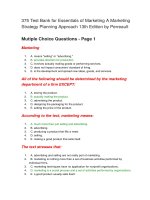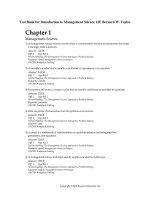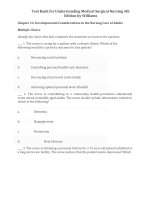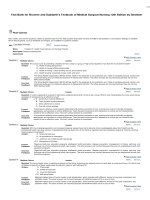Download test bank for andersons nursing leadership management and professional practice for the LPN LVN in nursing school and beyond 5th edition by dahlkemper
Bạn đang xem bản rút gọn của tài liệu. Xem và tải ngay bản đầy đủ của tài liệu tại đây (602.53 KB, 15 trang )
Link full download: />
Test Bank for Andersons Nursing Leadership
Management and Professional Practice For The
LPN LVN In Nursing School and Beyond 5th
Edition by Dahlkemper
Chapter 1: Historical Perspective and Current Trends
Multiple Choice
Identify the choice that best completes the statement or answers the question.
____ 1. The nursing student predominantly uses knowledge about the history of
nursing for what purpose?
1. To understand the professional choices open to the student
2. To prevent making medication errors in practice
3. To determine what geographical area is the best place to practice
4. To reduce the cost of delivering quality healthcare
____ 2. The nurse is working in an underdeveloped country and observes the natives
lighting ritual fires and pounding on primitive drums around the sick person to
promote recovery. The nurse interprets this behavior as indicating the natives
believe illness results from what?
1.
Pathogens and genetics
2.
Evil spirits
3.
Tides and planets
4.
Plants and animals
____ 3. The person credited with making a written record of healthcare practices and
removing the mythical aspect of healthcare is who?
1.
Hammurabi
2.
Florence Nightingale
3.
Hippocrates
4.
Apollo
____ 4. Who served as the first public health nurses, caring for the sick and the poor?
1.
The Presbyterian Church
2.
Salerno
3.
Jewish scholars
4.
Convent deaconesses
____ 5. What is a crucial issue the nurse working in the late industrialization era
would need to address in order to promote health?
1.
Reducing spread of infection
2.
Reducing sedentary lifestyle
3.
Teaching proper use of medications
4.
Teaching use of car seats
____ 6. What types of skills would a nursing student learn while attending
Kaiserworth Deaconess Institution in 1836?
1.
Administering immunizations
2.
Assisting in surgery
3.
Washing and changing bed linens
4.
Developing a plan of care
____ 7. The nurse demonstrates Florence Nightingale’s theory of nursing with what
intervention?
1.Respecting the patient’s culture and incorporating cultural needs in the plan of care
2.Promoting good health and treating those who are ill in a holistic manner
3.Understanding how to motivate people to practice a healthy lifestyle and reduce risks
4.Teaching other nurses how to deliver the highest quality of nursing care.
____ 8. What action performed by the nurse directly resulted from the contribution
made by Linda Richards?
1. Using an antiseptic before administering an injection
2. Exploring the psychosocial needs of the patient
3. Documenting patient care in the medical record
4. Listening to a patient describe his or her condition
____ 9. After graduating from nursing school, the graduate takes a licensure
examination as the result of what nurse’s contribution?
1.
Florence Nightingale
2.
Mary Adelaid Nutting
3.
Lavinia L. Dock
4.
Isabel Hampton Robb
____ 10. In addition to caring for the sick, what other skills would the first LPN
students learn when attending the Ballard School in New York in 1893?
1.
Political advocacy
2.
Homemaking
3.
Communication
4.
Carpentry
____ 11. The nurse responds to an alarm on a pulse oximeter and sees the patient’s
oxygen saturation is reading 38%. The nurse observes the patient, noting a
respiratory rate of 12 breaths per minute, pink mucous membranes, and easy
regular respirations. The nurse concludes the pulse oximeter is not reading
accurately. Whose theory of nursing is this nurse demonstrating?
1.
Annie Goodrich
2.
Lillian D. Wald
3.
Florence Nightingale
4.
Linda Richards
____ 12. What statement describes Florence Nightingale’s beliefs about nursing?
1. Practicing nurses should be licensed.
2. Promotion of good health and treating the ill are nursing priorities.
3. Nurses could simultaneously have a career and a marriage.
4. Organisms cause infection.
____ 13. What was Mary Eliza Mahoney’s contribution to nursing?
1. She organized the first visiting nurse association.
2. She founded the American Journal of Nursing.
3. She founded the National League of Nursing.
4. She worked for the acceptance of African Americans into the nursing profession.
____ 14. What professional organization was the first to focus on licensed practical
nurses (LPNs)?
1. National Association for Practical Nurse Education and Services (NAPNES)
2. National Federation of Licensed Practical Nurses (NFLPN)
3. National League for Nursing (NLN)
4. American Nurses Association (ANA)
____ 15. What statement accurately describes the NFLPN?
1. It represents both registered nurses (RNs) and LPNs.
2. It represents LPNs/LVNs only.
3. It is open to anyone interested in nursing.
4. It is open to anyone in the healthcare field.
____ 16. What organizations represent only LPNs/LVNs?
1.
ANA and NLN
2.
NFLPN and NLN
3.
NAPNES and NFLPN
4.
NAPNES and ANA
____ 17. The nurse working in mental health nursing honors what historical nurse for
working to improve care of the mentally ill?
1.
Clara Barton
2.
Florence Nightingale
3.
Dorothea Dix
4.
Lillian D. Wald
____ 18. What is the difference between the LPN and LVN nursing title?
1. LPNs have a longer educational program than LVNs.
2. LVNs and LPNs have the same duties and skills, just different titles.
3. LVNs are able to perform venipuncture and LPNs cannot.
4. LPNs are working toward an RN license while LVNs are not.
____ 19. What mythical god was believed to promote healthcare in ancient times?
1.
Apollo
2.
Zeus
3.
Isis
4.
Ares
____ 20. What factor has had the greatest impact on the current nursing shortage?
1. Later age of women having children
2. Fewer women being born
3. Overall unemployment rate
4. More employment options for women
____ 21. What health condition is classified as a World Health Organization priority
and a focus of health promotion for nurses?
1.
HIV
2.
MRSA
3.
Natural disasters
4.
Terrorism
____ 22. What trend in healthcare has only existed for the past decade and has
changed nursing education to prepare student nurses for practice after graduation?
1.
Technology
2.
Cultural diversity
3.
HIV
4.
Nursing shortage
Multiple Response
Identify one or more choices that best complete the statement or answer the question.
____ 23. What factors are contributing to the nursing shortage? (Select all that apply.)
1. Increased demand for nurses
2. Shortage of nursing faculty
3. Lack of nursing organizations
4. Nurses leaving the profession due to poor working conditions
5. Not enough interest in nursing
____ 24. The newly licensed LPN joins a professional organization for what benefits?
(Select all that apply.)
1. Opportunities to maintain current nursing knowledge
2. Most facilities mandate membership before hiring a nurse.
3. Organizations offer a way for the LPN’s voice to be heard regarding concerns.
4. They advocate for the LPN in professional matters.
5. It is a requirement for licensure in most states.
____ 25. In order to deliver the safest possible care, the nurse needs to understand
what? (Select all that apply.)
1. How to perform the procedure correctly
2. Why the procedure is being performed
3. How the procedure will affect the patient
4. The cost of performing the procedure
5. The equipment needed to perform the procedure
Chapter 1: Historical Perspective and Current Trends
Answer Section
MULTIPLE CHOICE
1.ANS:1
Understanding nursing history helps the nurse to better recognize the many choices
available when choosing their own future path.
PTS:1REF:Chapter: 1OBJ:Objective: 1
KEY: Content Area: History | Integrated Processes: Communication and
Documentation | Client Need: Safe, Effective Care Environment | Cognitive Level:
Applying
2.ANS:2
A belief that disease was caused by evil spirits would result in lighting fires or
candles and making loud noise to try to ward off the spirits.
PTS:1REF:Chapter: 1OBJ:Objective: 2
KEY:Content Area: History | Integrated Processes: Nursing Process | Client Need:
Psychosocial Integrity | Cognitive Level: Analyzing
3.ANS:3
Hippocrates wrote the first medical textbook, outlining current healthcare practices
and removed the mythical belief that Apollo was responsible for health. Hammurabi
wrote a code of laws to protect the patient and define legal limitations of caregivers,
Florence Nightingale introduced modern nursing during the Crimean War, and
Apollo was a mythical God who was believed to control health and wellness.
PTS:1REF:Chapter: 1OBJ:Objective: 2
KEY: Content Area: History | Integrated Processes: Communication and
Documentation | Client Need: Safe, Effective Care Environment | Cognitive Level:
Understanding
4.ANS:4
Deaconesses from local convents acted as the first public health nurses, providing
care for the sick and the poor based on the Christian belief in the importance of
caring for one another.
PTS:1REF:Chapter: 1OBJ:Objective: 2
KEY: Content Area: History | Integrated Processes: Communication and
Documentation | Client Need: Safe, Effective Care Environment | Cognitive Level:
Understanding
5.ANS:1
Many deaths resulted from communicable diseases and lack of cleanliness in
hospitals, so the nurse’s priority concern with health promotion would be reducing
the spread of infection.
PTS:1REF:Chapter: 1OBJ:Objective: 2
KEY:Content Area: History | Integrated Processes: Teaching/Learning | Client Need:
Health Promotion and Maintenance | Cognitive Level: Analyzing
6.ANS:3
Washing and changing bed linens, mopping floors, and housekeeping tasks were
included as part of the nurse’s education. Immunizations did not exist at that time in
history, and surgery was uncommon and very primitive with frequent poor
outcomes. Thus assistants were rarely required and not part of nursing school. Plan
of care considerations were not used until after the mid 1900s.
PTS:1REF:Chapter: 1OBJ:Objective: 2
KEY:Content Area: History | Integrated Processes: Teaching/Learning | Client Need:
Safe, Effective Care Environment | Cognitive Level: Understanding
7.ANS:2
Nightingale believed the nurse’s primary responsibilities included promoting health
and treating the ill.
PTS:1REF:Chapter: 1OBJ:Objective: 3
KEY: Content Area: History | Integrated Processes: Nursing Process | Client Need:
Health Promotion and Maintenance | Cognitive Level: Applying
8.ANS:3
Linda Richards developed a system for recording details about patients and patient
care. This system evolved into today’s documentation system.
PTS:1REF:Chapter: 1OBJ:Objective: 3
KEY: Content Area: History | Integrated Processes: Communication and
Documentation | Client Need: Safe, Effective Care Environment | Cognitive Level:
Applying
9.ANS:4
Isabel Hampton Robb fought for licensing examinations and registration to protect
patients from incompetent nurses, in order to raise the standard of the profession.
PTS:1REF:Chapter: 1OBJ:Objective: 3
KEY:Content Area: History | Integrated Processes: Caring | Client Need: Safe,
Effective Care Environment | Cognitive Level: Applying
10.ANS:2
LPN students learned homemaking skills, because much of the patient care they
provided was within the patient’s home.
PTS:1REF:Chapter: 1OBJ:Objective: 4
KEY:Content Area: History | Integrated Processes: Teaching/Learning | Client Need:
Safe, Effective Care Environment | Cognitive Level: Understanding
11.ANS:3
Florence Nightingale promoted treating the patient based on the patient’s individual
needs rather than treating the disease or, in this case, the machinery.
PTS:1REF:Chapter: 1OBJ:Objective: 3
KEY: Content Area: History | Integrated Processes: Communication and
Documentation | Client Need: Safe, Effective Care Environment | Cognitive Level:
Analyzing
12.ANS:2
One of Florence Nightingale’s strongest beliefs was that promoting good health and
treating the ill were nursing priorities. Throughout her career, Nightingale
implemented changes in the nursing practice to enhance the health of all who were
ill.
PTS:1REF:Chapter: 1OBJ:Objective: 3
KEY:Content Area: History | Integrated Processes: Nursing Process | Client Need:
Health Promotion and Maintenance | Cognitive Level: Understanding
13.ANS:4
Mary Eliza Mahoney was the first African American nurse in the United States. She
spent her life working for the acceptance of African Americans into the nursing
profession, and was also the organizer and the first president of the National
Association for Colored Graduate Nurses.
PTS:1REF:Chapter: 1OBJ:Objective: 3
KEY: Content Area: History | Integrated Processes: Caring | Client Need: Safe,
Effective Care Environment | Cognitive Level: Understanding
14.ANS:1
NAPNES was the first professional organization to focus on LPNs. NAPNES is very
active today, with continuing education opportunities and publications for LPNs.
While NFLPN focuses on LPNs, they were not the first to do so. NLN and ANA focus
on both RNs and LPNs.
PTS:1REF:Chapter: 1OBJ:Objective: 5
KEY: Content Area: Nursing Organizations | Integrated Processes:
Teaching/Learning | Client Need: Safe, Effective Care Environment | Cognitive Level:
Remembering
15.ANS:2
The NFLPN is considered the official membership organization for the licensed
practical nurse/licensed vocational nurse (LPN/LVN); therefore, only the LPN/LVN
may join this organization.
PTS:1REF:Chapter: 1OBJ:Objective: 5
KEY: Content Area: Nursing Organizations | Integrated Processes:
Teaching/Learning | Client Need: Safe, Effective Care Environment | Cognitive Level:
Remembering
16.ANS:3
The two vocational LPN organizations are the National Federation for Licensed
Practical Nurses (NFLPN) and the National Association for Practical Nurse
Education and Service (NAPNES). Both the ANA and the NLN focus on both RNs and
LPNs.
PTS:1REF:Chapter: 1OBJ:Objective: 5
KEY: Content Area: Nursing Organizations | Integrated Processes:
Teaching/Learning | Client Need: Safe, Effective Care Environment | Cognitive Level:
Remembering
17.ANS:3
Dorothea Dix championed the development of psychiatric hospitals, and her work
also brought about improvement for prisoners in jails.
PTS:1REF:Chapter: 1OBJ:Objective: 3
KEY:Content Area: History | Integrated Processes: Caring | Client Need: Safe,
Effective Care Environment | Cognitive Level: Applying
18.ANS:2
Both LPNs and licensed vocational nurses (LVNs) are legally recognized and
practice in diverse healthcare settings today. LVN education predominantly takes
place in California and Texas, whereas LPN education is common in other
geographic areas of the country.
PTS:1REF:Chapter: 1OBJ:Objective: 4
KEY:Content Area: Role of LPN | Integrated Processes: Caring | Client Need: Safe,
Effective Care Environment | Cognitive Level: Understanding
19.ANS:1
The primitive healthcare that was available was provided by males, except for the
midwives, and was promoted by a belief in Apollo, the mythical Greek healer.
PTS:1REF:Chapter: 1OBJ:Objective: 2
KEY: Content Area: History | Integrated Processes: Caring | Client Need: Safe,
Effective Care Environment | Cognitive Level: Remembering
20.ANS:4
One reality of the nursing shortage is that the 21st century woman has more
employment options than women had previously.
PTS:1REF:Chapter: 1OBJ:Objective: 6
KEY:Content Area: Trends | Integrated Processes: Caring | Client Need: Safe,
Effective Care Environment | Cognitive Level: Analyzing
21.ANS:1
The prevention and treatment of HIV is a World Health Organization priority. While
MRSA is a focus of health promotion for nurses, it is the CDC that is focusing on
reducing occurrence. The World Health Organization has not set natural disasters as
a priority because they cannot be controlled, and it is not focused on reducing
terrorism; nurses respond to terrorist events when they occur, but it is not a source
of health promotion.
PTS:1REF:Chapter: 1OBJ:Objective: 6
KEY: Content Area: Trends | Integrated Processes: Caring | Client Need: Health
Promotion and Maintenance | Cognitive Level: Remembering
22.ANS:1
The use of technology in healthcare has increased dramatically over the last decade,
and has become a major consideration in nursing education.
PTS:1REF:Chapter: 1OBJ:Objective: 6
KEY:Content Area: Trends | Integrated Processes: Caring | Client Need: Safe,
Effective Care Environment | Cognitive Level: Analyzing
MULTIPLE RESPONSE
23.ANS:1, 2, 4
Aging Baby Boomers, people living longer, and the increasing complexity of
healthcare have all increased the demand for nurses. Insufficient nursing faculty
results in turning potential nursing students away from nursing programs because
there aren’t enough educated faculty to teach them. Mandatory overtime, working
holidays and weekends, long hours without breaks, and other working conditions
can cause nurses to leave the profession. There is no lack of nursing organizations
and this does not contribute to the nursing shortage, and there is no lack of interest
in nursing but not everyone is designed to be a nurse.
PTS:1REF:Chapter: 1OBJ:Objective: 6
KEY: Content Area: Trends | Integrated Processes: Caring | Client Need: Safe,
Effective Care Environment | Cognitive Level: Understanding
24.ANS:1, 3, 4
Professional organizations provide lifelong learning opportunities for the LPN in the
form of journals, seminars, and annual meetings. They also provide the LPN a voice
for concerns and opinions, and they serve as an advocate for LPNs at the state and
national level. Membership in a nursing organization is not usually a requirement
for employment, but it can serve as a favorable indicator that the nurse is
maintaining current knowledge. While ongoing education is required by some
boards of nursing for licensure, there is no requirement the nurse belong to an
organization.
PTS:1REF:Chapter: 1OBJ:Objective: 6
KEY: Content Area: Trends | Integrated Processes: Caring | Client Need: Safe,
Effective Care Environment | Cognitive Level: Understanding
25.ANS:1, 2, 3, 5
Understanding how to perform the procedure correctly is important if the nurse is
to maintain safety. The nurse should never perform any procedure without
understanding why it is being performed and what outcome is desired. The nurse is
responsible for teaching the patient what to expect before the procedure is begun,
so the nurse must understand how the procedure will impact the patient. The nurse
will gather the equipment required to perform the procedure, therefore needs to
know what will and what might be needed. The nurse is not responsible for
knowing the cost of the procedure.
PTS:1REF:Chapter: 1OBJ:Objective: 6
KEY:Content Area: QSEN | Integrated Processes: Caring | Client Need: Safe, Effective
Care Environment | Cognitive Level: Applying









